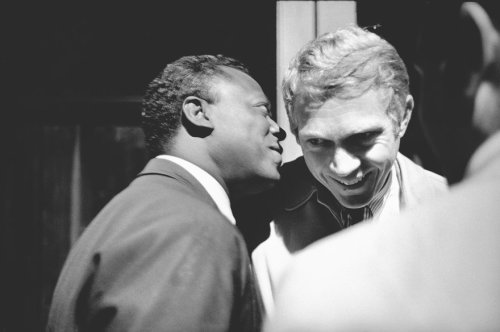#the guardian
Yo! Homos: Bros Before Ho’s, Y'all
In The Guardian we read, “Friendship, like forgiveness, modesty and tolerance, is a concept which we all instinctively recognise but which buckles under the pressure of philosophical definition. In this little study, AC Grayling charts the history of attempts to understand what friendship is; how a friend differs from a lover, an acquaintance or an ally; and how friendship relates to wider moral and ethical propositions. Beginning with Plato and Aristotle, and progressing via Cicero and Augustine to Montaigne, Kant and Godwin, Grayling assesses a formidable array of sources before turning his attention to literary depictions of friendship: Achilles and Patroclus, David and Jonathan, Nisus and Euryalus, Tennyson and Hallam. He concludes with his own insights into the idea of friendship, drawn from his own experience.
Part of the problem is purely linguistic. Grayling does not mention this, but there is a slippage in English between the idea of a "friend” and a “best friend”. It is even more complicated now that the word has become a verb: one may “friend” a complete stranger on Facebook. A thread joins together Aristotle’s statement in the Nicomachean Ethics – “his friend is another self” – to Cicero in De Amicitia – “in the face of a true friend we see a second self” – to Montaigne writing “if anyone urges me to tell why I loved him, I feel it cannot be expressed but by answering: Because it was he, because it was myself”. Grayling rightly questions whether this is solipsism – a friend is a friend depending on how closely they resemble us. But the opposite tradition – a friend complements us by having qualities we lack, as exemplified by Godwin’s sense of the inequality inherent in friendship – is equally problematic. If we push this to extremes, then we should seek out friends who supplement our zeal with idleness, our generosity with parsimony and our loyalty with treachery.
Grayling being a notable anti-theist, it is no surprise that he treats Christian views of friendship as an opportunity to take a few pot-shots at some large fish in a particularly small barrel. By doing so, he misses the chance to comment on a radical difference. In Cicero, for example, there is a vexed discussion of whether or not it is possible to be a true friend to someone who holds different political or ethical beliefs. The idea of treating people as if they were friends already seems to me to be a more profound shift in the concept than Grayling admits. He may have some fun with the idea that the infinite, self-sufficient deity should require being chums with sinners, but it is at the expense of realising that in religious ethics there is the very openness that he wishes for in terms of contemporary secular friendship. He praises the notion that “children in kindergarten will be unconsciously friends with anyone at all, of any persuasion, background, colour, faith or political family”. That one might consciously choose to befriend despite difference seems to me to be a religious rather than a philosophical proposition. The “as if” (treating people as if they were friends) is a leap of faith, not a cold piece of ratiocination.
In his section on literary friendship, Grayling eschews popular culture. His disquisition on friendship in minor medieval romances is interesting enough, but is pallid compared to the stark accuracy of, for example, Kirk and Spock (“I have been – and always shall be – your friend”, “Because the needs of the one outweigh the needs of the many”). Theseus and Pirithous have nothing compared to those exchanges. That fan fiction sexualises the relationship shows how uncomfortable we are with genuine friendship.
Friendship does have a political dimension – Aristotle said: “When men are friends there is no need for justice.” This idea was taken up by Jacques Derrida in The Politics of Friendship, a book absent from Grayling’s bibliography. Derrida argues, to my mind convincingly, that the discourse around friendship has surreptitiously promoted it as a private, not public, virtue. There is a chasm between EM Forster’s “If I had to choose between betraying my country and betraying my friend I hope I should have the guts to betray my country” and Carl Schmitt’s notorious idea that “every totality of people looks for friends because it has already enemies”. In Grayling’s decision not to engage with continental philosophy there is a listless conservatism. As the Rembrandts sang, appropriately enough in the theme tune for the TV show Friends, “it’s like you’re always stuck in second gear”.
Towards the end, Grayling addresses such questions as whether or not it is possible to have non-sexual friendships. There is a persistent determination to read homosocial friendships – David and Jonathanmost intriguingly – as homosexual loves. Can a man and woman ever be friends without some undercurrent of lust? This is the kind of discussion that must rely on personal experience rather than intellectual nicety. I would say that of course one can. But this again requires a specificity of language which English lacks. I have a dear female friend; when, once, after not seeing each other for a while, we opted for a luvvie double-cheek kiss, we both recoiled and found it embarrassing. Our friendship is more like the Greek distinction between erastes and eromenos, a cross-generational friendship that is in part based on the idea that the older teaches the younger pragmatically and the younger teaches the older sentimentally. That we nicknamed each other Darth Vintage and Darth Fogey probably sums up the difference from romantic love: this is a friendship based, like all, on trust, but with an element of the master and apprentice. Then there are “peer friendships” – I would count a certain BBC radio producer as a close friend. Our intellectual circles overlap, our mutual interests coincide and our views of the world chime even if they do not do so in the same key. Finally, there are the profound friendships. I would have to confess that the only person I think of as a “second self” is my wife. Nobody knows me better than her, for better or for worse, and neither of us has ever known anyone quite so capable of finishing the other’s sentences. Where we have differences, they supplement; where we have similarities, they enhance. All three are friends, but the nature of that friendship is radically different.
Grayling is, as ever, eloquent, widely read and succinct. His book is enjoyable, even when one feels a certain pond-skater quality to it: it rests precisely and precariously on the surface, and does not dare to go deep.“
Post link
Fanart I drew last month of NeroGeist’s amazing animation. For those of you who haven’t seen it, it’s called the Guardian and you can find it on youtube and newgrounds. Go watch it!!! It’s old but absolutely gold and a hidden internet gem.
Post link
The world is spending at least $1.8 trillion every year on subsidies driving the annihilation of wildlife and a rise in global heating, according to a new study, prompting warnings that humanity is financing its own extinction.
From tax breaks for beef production in the Amazon to financial support for unsustainable groundwater pumping in the Middle East, billions of pounds of government spending and other subsidies are harming the environment […]. This government support, equivalent to 2% of global GDP, is directly working against the goals of the Paris agreement and draft targets on reversing biodiversity loss, the research on explicit subsidies found, effectively financing water pollution, land subsidence and deforestation with state money.
The authors, who are leading subsidies experts, say a significant portion of the $1.8tn could be repurposed to support policies that are beneficial for nature and a transition to net zero, amid growing political division about the cost of decarbonising the global economy.
“Nature is declining at an alarming rate, and we have never lived on a planet with so little biodiversity,” [the former head of the UN climate change convention] said. “[…] The report highlights how redirecting, repurposing, or eliminating subsidies could make an important contribution to unlocking the $711 billion required each year to halt and reverse the loss of nature by 2030 as well as the cost of reaching net zero emissions.”
— The Guardian, “World spends $1.8tn a year on subsidies that harm environment, study finds”
The Communist Party of Australia condemns ongoing attempts on the part of the federal government to increase surveillance on ordinary Australians and to deny them their right to privacy and other political and human rights.
The current push to legislate for the retention of Internet users’ metadata must be defeated. Labor must stop its supine “bi-partisan” compliance with the demands of the Abbott government for more police state powers and stand up for the rights of Australians. Revelations from NSA whistle-blower Edward Snowden confirm that the electronic communications of people across the planet are being subjected to mass surveillance and harvested for later analysis. The Australian government must be compelled to protect the rights of the people it purports to represent.
The excuse offered for the mass spying project being put in place at the moment is that it protects Australians from acts of terrorism. Recent history puts lie to this claim. The perpetrator of the Lindt Café siege could not have done more to draw the attention of the responsible security forces to his violent potential. It is claimed 60 Australians are currently fighting with IS in Syria and Iraq and it has been confirmed that one person left Australia for this purpose using his brother’s passport. The recent arrest of two alleged would-be terrorists in Sydney followed a tip-off from a neighbour. Religion is being used for perverse political purposes. If the intention of the Australian government is truly to protect the population from terrorism this can and must be done without trampling on the rights of people to the privacy of their communications and without the construction of a police state.









